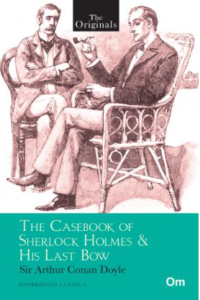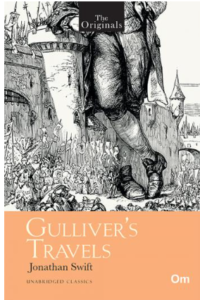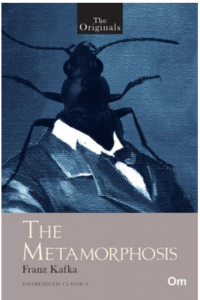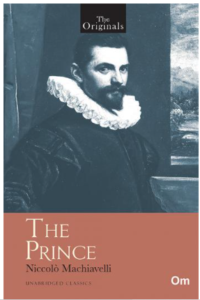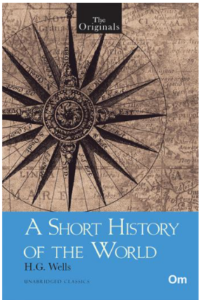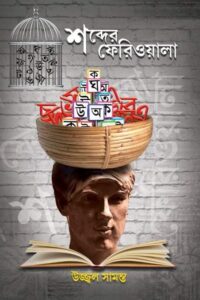16 results
- Brand: Om Books InternationalThe Casebook of Sherlock Holmes & His Last Bow ( Unabridged Classics) : The Originals
₹195.00₹147.00About The Book
Education never ends, Watson. It is a series of lessons, with the greatest for the last. The casebook of Sherlock Holmes & his last bow is the final collection of short stories by Sir Arthur Conan Doyle which features the beloved detective Sherlock Holmes and his sidekick Dr. Watson. This collection includes perhaps the most intriguing, almost Gothic, stories ever written about the detective and his companion and truly tests their brain and brawn. From murderous revenge to mutilation, vampires, and more strange occurrences, this collection explores a variety of themes and modes of narration that mark a break from the earlier stories while remaining as riveting. Adapted to film, television, and radio several times over, these stories truly remain Evergreen.
About Sir Arthur Conan Doyle
Born on 22 May 1859 in Edinburgh, SIR ARTHUR CONAN DOYLE started writing stories as a student. With a repertoire of over thirty books, hundred and fifty short stories, essays, plays and poems, he earned the distinction of being one of the greatest short story writers ever, since Edgar Allan Poe. A master of all literary genres, his memorable creation is the invincible sleuth Sherlock Holmes whom the readers are introduced to in his first novel, A Study in Scarlet (1887). Such was the charisma of this Great Detective that when the author decided to kill Holmes in His Last Bow (1893), he was compelled to bring Holmes back after vociferous demands from readers. A two-volume com- pendium, Sherlock Holmes: The Complete Novels & Stories 1 comprises some
of the significant adventures of the iconoclastic detective The Adventure of the Speckled Band, The Musgrave Ritual, A Scandal in Bohemia, and The Five Orange Pips among others. The Memoirs of Sherlock Holmes adds another dimension to this comprehensive collection.
A war correspondent, a spiritualist, an athlete and a historian, the author was knighted for his contribution in a South African field hospital during the Boer War in 1902. He died on 7 July 1930 in Crowborough, Sussex.
Other Books By Sir Arthur
- Brand: Om Books InternationalFranz Kafka Selected Works ( Unabridged Classics): The Originals
₹225.00₹169.00About The Book
Franz Kafka’s short stories—shocking, complex, intriguing, and unsettling—show him at the height of his writing prowess. Kafka takes on universal themes such as guilt, isolation, alienation, self-expression, cruelty, judgement, shame, sin, and redemption in them. Hovering between dream and reality, his dark and brilliantly crafted stories are populated by both humans and animals. They are intense, enigmatic, filled with generous doses of irony and horror that inspire the reader to search for meaning in the world’s maze. This collection features an impressive clutch of his short stories including In ‘The Penal Colony’, ‘The Hunger Artist’, ‘The Metamorphosis’, ‘The Burrow’, ‘The Judgment’, ‘Before the Law’, ‘A Country Doctor’, and ‘ The Great Wall of China’. ‘ The Penal Colony’ is seeped in the dehumanising horror of WWI and it mixes the dazzle of modern technological advances with the barbarism of archaic, absolute law. ‘The Metamorphosis’ in which the alienated hero turns into an insect is an exquisite study of the human condition. The characters in Kafka’s stories are hunted and haunted, wandering in a world governed by forces beyond their control.
About Franz Kafka
Franz Kafka (1883-1924), a German-speaking Bohemian Jewish novelist, was one of the foremost writers of the 20th century. His novels The Judgement (1913) and The Trial (1925), cemented his reputation as a writer. Kafka had a concise style of writing and the themes of despair and alienation were recurrent in his works. He was also a writer of fine short stories that were existentialist in tone.
Although he received little literary attention while he was alive, Kafka became an important figure of German literature when his close friend and literary executor, Max Brod, refused to destroy his novels, diaries and letters upon his death, as was instructed by Kafka. The term Kafkaesque derives from Kafka’s name and denotes the nightmarish, absurd and oppressive situations that the protagonists often face in his works.
Kafka died of tuberculosis, aged 40. - Brand: Om Books InternationalThe Alchemist ( Unabridged Classics) : The Originals
₹125.00₹94.00About The Book
Reading books is a kind of enjoyment. Reading books is a good habit. We bring you a different kinds of books. You can carry this book where ever you want. It is easy to carry. It can be an ideal gift to yourself and to your loved ones. Care instruction keep away from fire.
About Ben Jonson
Ben Jonson, born on 11 June 1572, was an English dramatist, poet, and literary critic. After completing his formal education, he joined his stepfather’s business, but left it to pursue a career in writing. By 1597, he was writing plays for Philip Henslowe. Jonson became a name to reckon with in 1598, when his play Every Man in His Humour was successfully presented by the Lord Chamberlain’s theatrical company.
Known for his literary craftsmanship and his fine artistic ability, Jonson’s direct influence is discernible in each genre he explored. Every Man in His Humour (1598), Volpone (1605), Epicoene; or, The Silent Woman (1609), and Bartholomew Fair (1614) are amongst his most notable plays.
Remembered as the second most important English dramatist after William Shakespeare, Jonson died in 1637. - Brand: Om Books InternationalRobinson Crusoe ( Unabridged Classics) : The Originals
₹175.00₹132.00About The Book
“First published in 1719, Robinson Crusoe by Daniel Defoe is one of the foremost works of English literature. A mix of adventure fiction, travelogue and autobiography, the novel was a huge success following its publication, running into several prints within Defoe’s lifetime. Although the novel is believed to have been based on the story of the Scottish castaway Alexander Selkirk, Defoe masterfully crafts the main story into a fascinating tale of ambition, adventure, spiritualism and bravery. The protagonist and narrator, Robinson Crusoe, writes about his voyages at sea and his mercantile drive which take him far from his native England. In the course of his journey, he is enslaved, shipwrecked on an island in the midst of cannibals, travels to Brazil and secures a plantation, besides much else. This wonderful tale gave rise to a literary genre, the Robinsonade. Robinson Crusoe remains an evergreen classic and has been adapted to film, television, comics and video games.”
About Daniel Defoe
Daniel Defoe (1660 – 1731), an English political pamphleteer, journalist and novelist was best known for his groundbreaking novels Robinson Crusoe (1719) and Moll Flanders (1722). Before becoming a writer, Defoe faced several hardships as a failing businessman who was constantly in debt. Moreover, his political pamphlets repeatedly led to his imprisonment.
It was only around the age of 59 that Defoe set off completely on a literary course and published his magnum opus Robinson Crusoe. This novel sealed his reputation as a writer. Thereafter followed other renowned works of fiction such as Moll Flanders (1722), Colonel Jack (1722) and The Fortunate Mistress: or, A History of the Life (1724). - Brand: Om Books InternationalFrankenstein( Unabridged Classics) : The Originals
₹150.00₹113.00About The Book
First published in 1818, Frankenstein or, The Modern Prometheus by Mary Shelley is the foremost gothic novel of the Romantic tradition and inspired several other works in the horror genre. Shelley was inspired to write the story—often considered the first science fiction story ever written—after a visit to the Frankenstein Castle, where, it was believed that two centuries back, an alchemist had conducted experiments. The story traces the life of Victor Frankenstein, a student of sciences at the University Of Ingolstadt, who creates a grotesque humanoid, commonly referred to as “the monster” in the novel. What follows is a tale of tragedy, isolation, betrayal and absolute horror. Frankensteinor, The Modern Prometheus has been adapted to film, stage and television and remains an evergreen classic.
About Mary Shelley
Mary Shelley (1797-1851) was a renowned English novelist, editor, biographer and short story writer. The daughter of political philosopher William Godwin and feminist writer Mary Wollstonecraft, Shelley was highly educated and infused radical political elements in her works. She is best-known for the widely acclaimed gothic novel Frankenstein, or The Modern Prometheus (1818), which is considered the first true science fiction story. Other major works by Shelley include Valperga (1823), The Last Man (1826) and Lodore (1835). Besides being an accomplished writer, Shelley also edited and promoted the works of her husband, Percy Bysshe Shelley, the renowned Romantic poet. She died in 1851, aged 53. - Brand: Om Books InternationalGulliver’s Travels ( Unabridged Classics) : The Originals
₹175.00₹132.00About The Book
“First published as Travels into Several Remote Nations of the World, Gulliver’s Travels is a fine example of satire on human nature as well as on the genre of travel writing. A masterpiece of English literature, the novel has never gone out of print since its publication in 1726. Its universality is truly commendable as it can be read as a children’s story as well as a work of satire on English politics and society. The story follows the adventures of Lemuel Gulliver as he travels to four distinct lands-Lilliput, Brobdingnag, the kingdom of Laputa and surrounding territories, and the Land of the Houyhnhnms where he meets curious creatures and witnesses worldviews starkly opposed to that of the English society he is so familiar with. An evergreen tale, Gulliver’s Travels has been adapted to music, film, television and radio several times over the years.”
About Jonathan Swift
Born on 30 November 1667, Jonathan Swift was a famous Irish author, satirist and clergyman well known for writing Gulliver’s Travels and A Tale of a Tub. Popular for being a political satirist, he worked as editor of the political magazine Examiner, the official paper of the Tories when they came to power in 1710. Swift also published an important political pamphlet known as The Conduct of the Day which was a sharp attack on the Whigs. He later went on to become the dean of St. Patrick’s Cathedral in Dublin, Ireland. - Brand: Om Books InternationalMoby Dick or The Whale ( Unabridged Classics) : The Originals
₹250.00₹188.00About The Book
As for me, I am tormented with an everlasting itch for things remote. I love to sail forbidden seas, and land on barbarous coasts. Originally published as Moby-Dick, or, the whale (1851), Herman Melville’s masterpiece, is one of the greatest American novels. The deceptively simple novel of the sea is filled with allegories and is open to interpretation, both religious and agnostic, amongst others. At the simplest level, The novel narrates Captain Ahab’s murderous obsession with the titular character, the whale, Moby-Dick after he loses his leg to it on a whaling mission. His quest for revenge drives him insane and deeply affects those around him. Beautifully written, Melville’s masterly narrative comes to the fore in his magnum opus, which was dedicated to American writer Nathaniel Hawthorne.
About Herman Melville
Born on 1 August 1819, Herman Melville, best known for his masterpiece, Moby-Dick, or, The Whale (1851), was an American novelist, poet and short story writer. Considered one of America’s greatest writers, he barely won much acclaim during his lifetime.
Melville’s novels of the sea such as Typee (1846) and Omoo (1847) are inspired by his own marine adventures. His own struggles and conflicts during his lifetime are manifested beautifully in his artistic vision.
In the latter part of his writing career, Melville’s short stories became more dark and complex, and his prose reflected the materialism and moral degradation of American society in the 19th century.
He died on 28 September 1891, aged 72. - Brand: Om Books InternationalThe Mill on the Floss ( Unabridged Classics) : The Originals
₹250.00₹188.00About The Book
“First published in 1860, The Mill on the Floss is one of the most famous works by George Eliot, the pen-name adopted by Mary Ann Evans. Her most autobiographical work, it explores falling in love, tensions between siblings as well as the lack of intellectual freedom that Evans herself experienced. The story chronicles the life of Maggie Tulliver, who is robust, intelligent and fierce, and often in conflict with her family because of these traits. She seeks the cultured life of intense intellectual activity, represented by Philip Wakem, much to the disdain of her beloved brother Tom. The Mill on the Floss, a classic tale of unfulfilled love, growing up in distress and pain, and forgiveness, has been adapted to film and television. It remains one of Evans’s most cherished works.”
About George Eliot
Mary Ann Evans (1819-1880), better known under her pen-name George Eliot , was a British journalist, critic, poet and novelist from the Victorian period. She was credited with introducing the method of psychological analysis that plays a major role in modern fiction. Some of her major works include The Mill on the Floss (1860), Silas Marner (1861) and Middlemarch (1871-72).
Evans deliberately chose a pen-name to distance herself from the stereotypical women’s writings primarily lighthearted romances. Instead, she focused on the intellectual pursuit of providing psychological insight to her characters. Her novels were highly political in nature.
Evans died at the age of 61. She is still regarded as one of the most important writers of the Victorian Age. - Brand: Om Books InternationalThe Metamorphosis ( Unabridged Classics) : The Originals
₹125.00₹94.00About The Book
I cannot make you understand. I cannot make anyone understand what is happening inside me. I cannot even explain it to myself. Originally published in German as die verwandlung (1915), The metamorphosis is one of the Austrian writer Franz Kafka finest stories. A masterpiece of absurdist ‘Kafkaesque’ fiction, The novella traces the life of a salesman, Gregor SA MS a, who wakes up one day to find himself transformed into a hideous insect. With its myriad psychological, sociological, feminist and artistic interpretations, this novella remains a favourite amongst literary critics. Subsequent writers of absurdist fiction were deeply inspired by the metamorphosis, that has been adapted into film, television and theatre since it was first published.
About Franz Kafka
Franz Kafka (1883-1924), a German-speaking Bohemian Jewish novelist, was one of the foremost writers of the 20th century. His novels The Judgement (1913) and The Trial (1925), cemented his reputation as a writer. Kafka had a concise style of writing and the themes of despair and alienation were recurrent in his works. He was also a writer of fine short stories that were existentialist in tone.
Although he received little literary attention while he was alive, Kafka became an important figure of German literature when his close friend and literary executor, Max Brod, refused to destroy his novels, diaries and letters upon his death, as was instructed by Kafka. The term Kafkaesque derives from Kafka’s name and denotes the nightmarish, absurd and oppressive situations that the protagonists often face in his works.
Kafka died of tuberculosis, aged 40. - Brand: Om Books InternationalThe Republic ( Unabridged Classics) : The Originals
₹225.00₹169.00About The Book
The Republic by Plato is a Socratic dialogue, written around 380 BC; it is one of the most influential works of political philosophy. As is the norm in Socratic dialogue, here too, Socrates is the main speaker who engages in dialogue with other Athenians on the idea of justice. The central question that Plato addresses is “What is justice?” both at the individual and political levels. He supplements his ethical question with the secondary question “What is the relation of justice to happiness?” He furthers his argument with examples of a just city (Kallipolis) as well as through discussions of different modes of justice, virtues and vices, the importance of a philosophical king, amongst other ideas. Since mid-19th century, The Republic has remained one of Plato’s widely read dialogues and continues to influence political thought.
About Plato
Born c. 428 bc, Plato, amongst the most influential philosophers of Classical Greece, played a major role in shaping Western thought. A student of the famed philosopher Socrates, he was the teacher of the equally influential philosopher Aristotle, a student at the Academy founded by Plato. Considered the world’s first university of philosophy, the Academy is where Plato propagated his philosophical ideas.
The first to relate philosophy with polity, Plato is known for his Dialogues, considered to mark the beginning of Western philosophy. Some of his influential works are Republic (380 bc), Apology (399 bc) and Symposium (c. 380-375 bc). His major ideas include Platonic Love, Theory of Mimesis and Plato’s Cave.
Plato is believed to have died c. 424 bc, and is buried in the grounds of his Academy. - Brand: Om Books InternationalTo The Lighthouse : The Originals
₹150.00₹113.00About The Book
“And all the lives we ever lived and all the lives to be are full of trees and changing leaves. Virginia Woolf’s most autobiographical novel, To the Lighthouse (1927) revolves around the Ramsay family and their life in the summer home situated at a distance from a lighthouse, in the Hebrides, Isle of Skye in Scotland between 1910 and 1920. Enjoying the summer with their eight children, the Ramsays host an assortment of guests—Charles Tansley, an admirer of Mr. Ramsay’s work as a philosopher; Lily Briscoe, a young artist, and William Bankes, an old friend of the Ramsays, among others. Six-year-old James Ramsay wants his father to take him to the lighthouse, but Mr Ramsay keeps delaying the trip. And when the summer ends, war and death alter many realities. The journey to the lighthouse is deferred. A book of childhood desires, conflicting adult relationships, philosophical introspection, and multiple subjectivities, To the Lighthouse, divided into three sections—The Window, Time Passes, The Lighthouse—is about many journeys and an evergreen classic.”
About Virginia Woolf
Born on 25 January 1882, Virginia Woolf was one of the most influential modernist 20th-century English writers, notable for using stream of consciousness as a literary technique in her works. While writing anonymous reviews for journals, she resolved to ‘re-form’ the novel by experimenting with dreams and delirium. Her novel Melymbrosia, which she completed in 1912 was born out of this determination. Recast and published in 1915 as The Voyage Out, it was about a young woman’s journey of selfdiscovery on her father’s ship in South America. Later, she modelled many of her characters on real-life associates and acquaintances.
At the onset of 1924, the Woolfs moved their residence from the suburbs back to Bloomsbury, where a relationship blossomed between the aristocratic Vita Sackville-West and Virginia. With Sackville-West, she learned to face her anxieties and overcome her nervous ailments. In fact, Orlando, a fantastical biography is partly a portrait of Vita Sackville-West.
One of the most important chapters in her early life was the summer home the family visited in St Ives, Cornwall, where she first beheld the Godrevy Lighthouse. To the Lighthouse (1927) is, therefore, considered one of her most autobiographical novels. Apart from her extremely popular extended essay, ‘A Room of One’s Own’ (1929), her other seminal works include-Mrs Dalloway (1925), Orlando (1928) and The Waves (1931).
In 1941, Virginia Woolf drowned herself in a river, aged 59. Her last work, Between the Acts, was posthumously published later that year. - Brand: Om Books InternationalThe Art of War : The Originals
₹195.00₹147.00About The Book
“…to fight and conquer in all your battles is not supreme excellence; supreme excellence consists in breaking the enemy’s resistance without fighting. The Art Of War is believed to have been written by the Chinese military strategist, philosopher and writer Sun Tzu around 5th century BC. Divided into thirteen chapters, the text is a finely crafted, meticulous guide that deals with military tactics and manoeuvres, which remain relevant and influential even today. Anthologised under Seven Military Classics Of Ancient China, not only has it shaped East Asian warfare, it has also inspired military experts in the West over the centuries. Despite dealing with military stratagem, the text has also inspired experts in the fields of politics, law, sports and business. As a result, The Art Of War has been translated into several languages including English, French, Manchu, Assamese, and other Asian languages.”
About Sun Tzu
Sun Tzu, born in the late Spring and Autumn period of China, was a military strategist, philosopher and writer who was most famous for writing the widely influential The Art Of War (5th century bc), the oldest military treatise in the world. While little is known about Sun Tzu’s early life, it is widely believed that he served as a military general under King Helu of Wu, and was a venerated military figure in Chinese and East Asian culture.
His fame spread to the West from 20th century on, when The Art Of War was translated into English and French. The military tactics and manoeuvres
prescribed in the book were applicable to various competitive fields, which led to the increasing importance of both, the text and its author. - Brand: Om Books InternationalThe Originals Meditations : The Originals
₹195.00₹147.00About The Book
You have power over your mind—not outside events. Realise this, and you will find strength. Meditations, written by the Roman Emperor Marcus Aurelius (AD 161-180), is the common name for a series of personal notes that the Emperor wrote to himself, probably without the intention to ever publish his work. Deeply influenced by Stoicism, the writings were probably a means for self-improvement. The simplicity and wisdom of the quotations make them relatable for the common reader. The series is divided into twelve books, which correspond to different phases of the Emperor’s life. Nevertheless, the central themes of self-reflection and self-discipline run throughout his writings. Aurelius believed in the need to bring the self in harmony with the universe, control rash reactions and look for logical solutions. One of the most influential philosophical books ever written, Meditations paves a way of life that is deeply influenced by teachings of Stoic philosophy.
About Marcus Aurelius
Born on 26 April 121 CE, Marcus Aurelius was the Emperor of Rome from 161-180 CE. Considered the last successor of the Five Good Emperors, who were from the Nerva-Antonine dynasty, he was associated with the Golden Age of the Roman Empire.
Best known for his widely acclaimed philosophical notes, Meditations, the Emperor was a practitioner of Stoicism. Well-versed in Greek and Latin, he chose to record his reflections in Greek. Written at a turbulent time when he was securing the trans-Danubian frontiers against German invasion, the reflections were personal and a means for selfimprovement and guidance for the Emperor-Philosopher.Celebrated for nobility of character and his philosophical achievement embodied in Meditations, Marcus Aurelius died in 180 CE, marking the end of Pax Romana, the period of peace and stability, for the Roman Empire.
- Brand: Om Books InternationalThe Prince : The Originals
₹150.00₹113.00About The Book
“Everyone sees what you appear to be, few experience what you really are. Niccol� Machiavelli wrote The Prince�a book on the ruthless acquisition of power and governance of the State�with the intention of appeasing Lorenzo de� Medici, the ruler of Florence, in the hope of resuscitating his political career. Often referred to as Machiavelli�s �job application� in disguise, The Prince foregrounded the contrasting aspects of virtue and vice: virtue is not always an admirable trait and vice is not always detrimental to society. He presented an �unsentimental� analysis of human behaviour and justified acts of immorality, deceit and deviousness to control a State. Written in 1513, shortly after Machiavelli was exiled from Florence, The Prince was posthumously published in 1532. Prohibited by the Court of Rome, The Prince was also banned by the Catholic Church. By early 1600s, William Shakespeare used �Machiavel� as a term to describe an unscrupulous, devious and scheming person in his works. Even today, �Machiavellian� means everything evil.”
About Niccolo Machiavelli
Born on 3 May 1469 in Florence, Niccol di Bernardo dei Machiavelli was a historian, diplomat, politician, philosopher, humanist, and writer. Regarded as the founder of modern political science, Machiavelli lived in the turbulent times of power struggles among European states and the Holy Roman Empire.
The young Machiavelli became a diplomat after the temporary fall of Florence’s ruling Medici family in 1494. From 1498 to 1512, he served as secretary to the Second Chancery of the Republic of Florence. Between 1503 and 1506, Machiavelli was responsible for the Florentine militia. In 1509, under his tutelage, Florentine citizen soldiers defeated Pisa. After his plans to organise a Florentine militia against the return of the Medici family to power in 1512 were unearthed, Machiavelli was banished from politics and thrown into prison. It was during this time that he earned the reputation for being shrewd and ruthless. In fact, the term Machiavellian is often associated with deviousness and political deceit.
After the death of Pope Julius II in 1513, the son of Lorenzo de Medici became Pope Leo X. Machiavelli hoped that by dedicating his most renowned work The Prince to Lorenzo de Medici, he would obtain an office that would help him return to public life. Alas, that was not to be.
Machiavelli’s other seminal works include On the Art of War (1521), The Mandrake (1524) and Discourses on Livy which was published posthumously in 1531. He also wrote carnival songs, comedies and poetry.
Following a period of illness, Machiavelli died on 21 June 1527, aged 58. - Brand: Om Books InternationalA Short History of The World ( Unabridged Classics): The Originals
₹295.00₹222.00About The Book
One of the founders of innovative science fiction novels, H.G. Wells was as taken up with the real world as his imaginary realm. Dissatisfied with the quality of history books at the end of World War I, the writer began penning his own history of the world. First published in 1922, A Short History of the World presents a groundbreaking study of the civilisation from the origins of the Earth—spanning the Neolithic Era, the rise of Judaism, the Golden Age of Athens, Christ’s life, the great discovery of America—to the consequences of World War I. Inspired by Wells’s The Outline of History (1919)—a work in three volumes, beginning with Prehistory and following the world’s significant events through World War I—this condensed work chronicles the physical, intellectual and spiritual evolution of the human race. Wells adopts a Darwinian approach and avoids presenting history within a politicised framework. Passionately told, A Short History of the World remains an evergreen classic.
About H.G. Wells
HERBERT GEORGE WELLS was born on 21 September 1866, in Bromley, England. In 1874, Wells, the son of domestic helpers-turned-shopkeepers, had an accident that left him bedridden for months. It was during this time that an avid reader was born. His father would bring him books from the local library and Wells would spend hours devouring the written word. Later, when his mother returned to working as a maidservant in a country house in Sussex, Wells found himself in the owner’s magnificent library, immersed in the works of stalwarts like Jonathan Swift, Charles Dickens, Sir Thomas More, Plato, Daniel Defoe and others. As a teenager, Wells worked as a draper’s assistant but eventually quit. Later, he won a scholarship to the Normal School of Science (later, the Royal College) where he learned about astronomy, biology, chemistry, and physics, among other subjects. All through, Wells nursed the secret desire to become a writer someday. In 1895, following the publication of The Time Machine, Wells became an overnight sensation. The story of an English scientist developing a time travel machine earned him the title of Father of Futurism. Wells’ successive books, often termed as ‘scientific romances’ included The Island of Doctor Moreau (1896), The Invisible Man (1897) and The War of the Worlds (1898) Wells’ works reflected the need for a society that flourished on the ideas and principles of global socialism. Published in 1920, The Outline of History is regarded as Wells’ best-selling work. A champion of social and political ideas, he also ran for Parliament as a Labour Party candidate between 1922 and 192 The visionary author, sociologist, journalist, and historian breathed his last on 13 August 1946, aged 79. - Brand: Om Books InternationalThe Time Machine ( Unabridged Classics) : The Originals
₹150.00₹113.00About The Book
It sounds plausible enough tonight, but wait until tomorrow. Wait for the common sense of the morning. Born out of H.G. Wells’ literary vision of the future, The Time Machine (1895) is an extraordinary work of early science fiction. A Victorian scientist builds a time machine and lands in the year 802,701 AD. Initially, he is transported to the pastoral idyll of an unknown land which is delightfully peaceful. Soon, however, the paradisiacal façade shatters and he discovers the reality of two distinct species: Eloi are useless, childlike adults surviving on a fruit based diet, and Morlocks who are barbarians thriving underground. The Time Traveller saves one of the Eloi from drowning, and navigates through tunnels to retrieve his time machine that has gone missing. Before returning to his era, The Time Traveller also visits a land where a bloated red sun stares motionless in the sky and the only sign of life is a black blob with tentacles. Once again, the scientist prepares to leave on another time travel, but this time will he return?
About H.G. Wells
HERBERT GEORGE WELLS was born on 21 September 1866, in Bromley, England. In 1874, Wells, the son of domestic helpers-turned-shopkeepers, had an accident that left him bedridden for months. It was during this time that an avid reader was born. His father would bring him books from the local library and Wells would spend hours devouring the written word. Later, when his mother returned to working as a maidservant in a country house in Sussex, Wells found himself in the owner’s magnificent library, immersed in the works of stalwarts like Jonathan Swift, Charles Dickens, Sir Thomas More, Plato, Daniel Defoe and others. As a teenager, Wells worked as a draper’s assistant but eventually quit. Later, he won a scholarship to the Normal School of Science (later, the Royal College) where he learned about astronomy, biology, chemistry, and physics, among other subjects. All through, Wells nursed the secret desire to become a writer someday. In 1895, following the publication of The Time Machine, Wells became an overnight sensation. The story of an English scientist developing a time travel machine earned him the title of Father of Futurism. Wells’ successive books, often termed as ‘scientific romances’ included The Island of Doctor Moreau (1896), The Invisible Man (1897) and The War of the Worlds (1898) Wells’ works reflected the need for a society that flourished on the ideas and principles of global socialism. Published in 1920, The Outline of History is regarded as Wells’ best-selling work. A champion of social and political ideas, he also ran for Parliament as a Labour Party candidate between 1922 and 192 The visionary author, sociologist, journalist, and historian breathed his last on 13 August 1946, aged 79.

